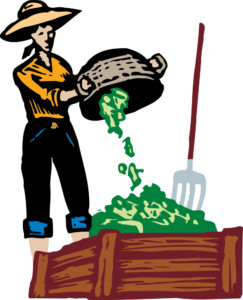Hi Everyone!
It’s that time again to make the most of any clement weather during the coming month and do some simple tasks to tidy-up the garden and prepare the ground for next year.But first a word about soil from R.Milton Carleton, who was an expert in soil chemistry:
‘Soil is the most fascinating element in your garden, and it is also, for practical purposes, an easy to understand element.Types of soil, organic and mineral content, and the activity of soil fungi and bacteria, all bear heavily on your success with plants.With a minimum of knowledge you can make this marvellous material-soil- your greatest gardening ally.’
Bearing this in mind, some simple things to do at this time are:
Flower beds and borders
Light weeding will help aerate and drain the soil and allow nutrients to reach plant roots, and it can also aid resistance to diseases and pests. Some light falling of leaves can be left to rot away and help enrich the soil.
Lawn care
For simple lawn care at this time of year, remove fallen leaves by raking and gathering, otherwise your grass may grow yellowish in colour and encourage pests and disease. The leaves should be collected and allowed to break down to be later used as a valuable protective mulch.
This is a job I failed to do properly last year and it showed this year!
Composting for soil health next year
As we have seen, for plants to thrive other materials have to decay in a natural process of nature.Composting provides the natural remedy for re-invigorating depleted ground exhausted by the recent growing seasons. This is the time to focus on this process using a partially enclosed area set aside for the purpose, level and well drained; or for convenience you could buy an inexpensive proprietary compost bin.
To prepare compost, organic material, micro-organisms, air, water, and a small amount of nitrogen are needed.
Not all organic items should be composted. These items are safe to compost at home:
* grass clippings
* trimmings from hedges
* vegetable scraps
* leaves
* potting soil that has grown old
* twigs
* coffee filter papers with coffee grounds
* tea bags
* weeds that have not gone to seed, shred roots
* plant stalks, shredded
These items are Not safe to compost at home:
* weeds that have gone to seed
* dead animals
* pet faeces
* bread and grains
* meat
* grease
* cooking oil
* oily foods
*diseased plants
This biological process is one that involves bacteria fungi and other soil organisms.If you keep your soil in good shape the less you will need pesticides or add fertilisers next year.
And a final word to reinforce this from the Royal Horticultural Society:Home composting is the most environmentally-friendly way of dealing with kitchen and garden waste, plus it produces compost that can be used as an excellent soil improver.
Happy gardening now!

